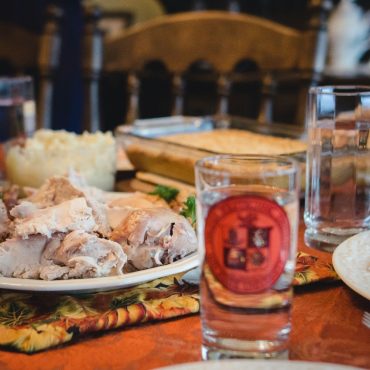
Esau sold his birthright for a bowl of stew. How many Christians sell their spiritual birthright for the world’s equivalent of a bowl of stew?
Scripture:
Genesis, chapters 25-26; Psalm 6; Luke, chapter 10
Genesis 25:27-34 (CEB):
When the young men grew up, Esau became an outdoorsman who knew how to hunt, and Jacob became a quiet man who stayed at home. Isaac loved Esau because he enjoyed eating game, but Rebekah loved Jacob. Once when Jacob was boiling stew, Esau came in from the field hungry and said to Jacob, “I’m starving! Let me devour some of this red stuff.” That’s why his name is Edom.
Jacob said, “Sell me your birthright today.” Esau said, “Since I’m going to die anyway, what good is my birthright to me?”
Jacob said, “Give me your word today.” And he did. He sold his birthright to Jacob. So Jacob gave Esau bread and lentil stew. He ate, drank, got up, and left, showing just how little he thought of his birthright.
Observations:
Esau’s Birthright
The birthright was a special privilege accorded to the eldest son in a family. In the Bible, the birthright typically referred to rights of inheritance; the eldest son received a double share of his father’s estate. Obviously, that could be very financially important, but it was always important in the sense of carrying on the family name.
Unfortunately, Esau did not treat his birthright with the respect that it deserved. Esau and Jacob were the only sons of Isaac. Isaac, in turn, received all of Abraham’s estate (Genesis 25:5). So Esau and Jacob were likely to receive a significant inheritance when Isaac died. Because Esau had the birthright, his inheritance would have been roughly twice as much as Jacob’s. But as the eldest son, Esau would also have been the one through whom Isaac’s line was traced.
We get a glimpse of Esau’s personality in this passage. He came in from the fields, hungry. Jacob was cooking lentil stew. Esau said, “I’m starving! Let me devour some of this red stuff.” Now, it is very unlikely that Esau was literally starving. Esau’s statement demonstrates that he was very much a “live in the moment” person. He was hungry, and that hunger was the most important thing in the world to him at that point.
Esau Sells His Birthright
Jacob, on the other hand, was very calculating. It’s obvious that Jacob and Esau were not identical twins! They didn’t look alike nor act alike. Jacob obviously knew his brother’s personality. When Esau said, “I’m starving!” Jacob saw his opportunity. “Sell me your birthright.” I have no idea how much Isaac owned, but Scripture seems to indicate that his assets were significant. The idea that Esau would sell his birthright for a bowl of stew and some bread seems impossible.
But Esau “despised his birthright,” as the NASB text of verse 34 puts it. The CEB translation says that he ate, drank, got up, and left, showing just how little he thought of his birthright. I guess so! He let a very temporary situation – he was hungry – cloud his judgment so much that he practically gave his birthright away.
Application: Esau Despised His Birthright
The phrase showing just how little he thought of his birthright caught my attention today. I think it’s because, unfortunately, I’ve seen far too many people who treat their spiritual birthright the same way. There was a song a number of years ago by Big Tent Revival called Star in the Book of Life. There’s a line in the chorus that says: “Angels are watching you overtime. They can’t understand why a child of the king would be happier living with swine.” That, of course, is a reference to the parable of the Prodigal Son (Luke 15:11-32). But the sentiment and the situation is similar. Esau, the oldest son, gave away his birthright. The prodigal son took his inheritance and wasted it.
And too many people who have begun following Jesus have sold their spiritual birthright for a bowl of stew. It might be the world’s wealth, or fame, or pleasures, but the result is the same. All of those things are fleeting. Their pleasure lasts about as long as Esau’s bowl of stew. As the writer of Hebrews describes it: You know that afterward, when he wanted to inherit the blessing, he was rejected because he couldn’t find a way to change his heart and life, though he looked for it with tears (Hebrews 12:17, CEB).
I believe God is urging us today: don’t sell your birthright for a bowl of the world’s stew! That doesn’t mean that you can’t repent later, but we need to remember that repentance becomes harder and harder as we go on. Repentance means a change of heart and life, as the writer of Hebrews put it. Real repentance requires a change of both action and attitude, and our hearts become harder and harder with each refusal to accept God’s way and turn back to him. Don’t be like Esau!
Prayer:
Father, thank You for reminding us how important it is to value our relationship with You – our spiritual birthright. We are children of the King! Our inheritance is in Your eternal kingdom, and there is nothing in this world that compares to that! Guard us from the attitude of Esau, who thought so little of his birthright that he traded it for a bowl of stew. No matter how “appetizing” Satan’s enticements may be, any “pleasure” will be over in an instant. Our spiritual birthright will last for eternity! Lead us in Your way today, that we may see Your kingdom come. Amen.

















Post comments (0)